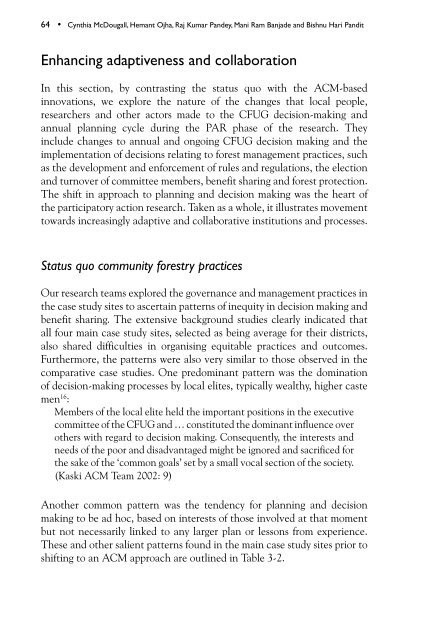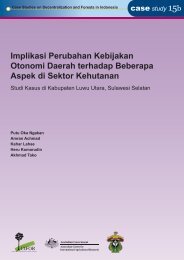Adaptive collaborative management of community forests in Asia ...
Adaptive collaborative management of community forests in Asia ...
Adaptive collaborative management of community forests in Asia ...
You also want an ePaper? Increase the reach of your titles
YUMPU automatically turns print PDFs into web optimized ePapers that Google loves.
64 • Cynthia McDougall, Hemant Ojha, Raj Kumar Pandey, Mani Ram Banjade and Bishnu Hari Pandit<br />
Enhanc<strong>in</strong>g adaptiveness and collaboration<br />
In this section, by contrast<strong>in</strong>g the status quo with the ACM-based<br />
<strong>in</strong>novations, we explore the nature <strong>of</strong> the changes that local people,<br />
researchers and other actors made to the CFUG decision-mak<strong>in</strong>g and<br />
annual plann<strong>in</strong>g cycle dur<strong>in</strong>g the PAR phase <strong>of</strong> the research. They<br />
<strong>in</strong>clude changes to annual and ongo<strong>in</strong>g CFUG decision mak<strong>in</strong>g and the<br />
implementation <strong>of</strong> decisions relat<strong>in</strong>g to forest <strong>management</strong> practices, such<br />
as the development and enforcement <strong>of</strong> rules and regulations, the election<br />
and turnover <strong>of</strong> committee members, benefit shar<strong>in</strong>g and forest protection.<br />
The shift <strong>in</strong> approach to plann<strong>in</strong>g and decision mak<strong>in</strong>g was the heart <strong>of</strong><br />
the participatory action research. Taken as a whole, it illustrates movement<br />
towards <strong>in</strong>creas<strong>in</strong>gly adaptive and <strong>collaborative</strong> <strong>in</strong>stitutions and processes.<br />
Status quo <strong>community</strong> forestry practices<br />
Our research teams explored the governance and <strong>management</strong> practices <strong>in</strong><br />
the case study sites to ascerta<strong>in</strong> patterns <strong>of</strong> <strong>in</strong>equity <strong>in</strong> decision mak<strong>in</strong>g and<br />
benefit shar<strong>in</strong>g. The extensive background studies clearly <strong>in</strong>dicated that<br />
all four ma<strong>in</strong> case study sites, selected as be<strong>in</strong>g average for their districts,<br />
also shared difficulties <strong>in</strong> organis<strong>in</strong>g equitable practices and outcomes.<br />
Furthermore, the patterns were also very similar to those observed <strong>in</strong> the<br />
comparative case studies. One predom<strong>in</strong>ant pattern was the dom<strong>in</strong>ation<br />
<strong>of</strong> decision-mak<strong>in</strong>g processes by local elites, typically wealthy, higher caste<br />
men 16 :<br />
Members <strong>of</strong> the local elite held the important positions <strong>in</strong> the executive<br />
committee <strong>of</strong> the CFUG and … constituted the dom<strong>in</strong>ant <strong>in</strong>fluence over<br />
others with regard to decision mak<strong>in</strong>g. Consequently, the <strong>in</strong>terests and<br />
needs <strong>of</strong> the poor and disadvantaged might be ignored and sacrificed for<br />
the sake <strong>of</strong> the ‘common goals’ set by a small vocal section <strong>of</strong> the society.<br />
(Kaski ACM Team 2002: 9)<br />
Another common pattern was the tendency for plann<strong>in</strong>g and decision<br />
mak<strong>in</strong>g to be ad hoc, based on <strong>in</strong>terests <strong>of</strong> those <strong>in</strong>volved at that moment<br />
but not necessarily l<strong>in</strong>ked to any larger plan or lessons from experience.<br />
These and other salient patterns found <strong>in</strong> the ma<strong>in</strong> case study sites prior to<br />
shift<strong>in</strong>g to an ACM approach are outl<strong>in</strong>ed <strong>in</strong> Table 3-2.
















